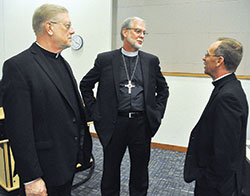Lutheran bishop delivers lecture at Marian on Reformation anniversary

Archbishop Charles C. Thompson, right, speaks with Lutheran Bishop William O. Gafkjen on Sept. 17 at Marian University prior to a lecture that Bishop Gafjken gave on the 500th anniversary of the start of the Protestant Reformation. Bishop Gafkjen is the shepherd of the Indiana-Kentucky Synod of the Evangelical Lutheran Church in America. Father Rick Ginther, left, director of the archdiocesan Office of Ecumenism and pastor of Our Lady of Lourdes Parish in Indianapolis, looks on. (Photo by Sean Gallagher)
By Sean Gallagher
A Lutheran bishop giving a lecture titled “The Meaning and Enduring Significance of the Reformation” on a Catholic university campus.
Such a scenario would have been unthinkable for most of the 500 years since the Protestant Reformation was launched on Oct. 31, 1517, when Martin Luther famously nailed his “95 Theses” to the door of a church in Wittenberg, Germany.
But it is what happened on Sept. 17 at Marian University in Indianapolis when such a lecture was delivered by Bishop William O. Gafkjen, the shepherd of the Indiana-Kentucky Synod of the Evangelical Lutheran Church in America, which is made up of 185 congregations and other ministries across the two states.
Sponsored by Marian’s theology and philosophy department, the lecture was attended by more than 100 people, including Archbishop Charles C. Thompson.
In his lecture, Bishop Gafkjen spoke about the ecumenical efforts over the past half century among Lutherans, Catholics and other Christians that have helped them all come to realize and emphasize the many fundamental beliefs they hold in common.
He illustrated this by describing a Lutheran worship service in Namibia in southern Africa he attended earlier this year in which he was joined by some 10,000 other worshippers. It was part of a meeting of the World Lutheran Federation.
When it was time in the service for a profession of faith, Cardinal Kurt Koch, president of the Pontifical Council for Promoting Christian Unity, led the congregation and the many Lutheran leaders in professing the Apostles Creed.
“As I sat in the Namibian heat, I wished those 16th-century European reformers could have been sitting right there next to me,” said Bishop Gafkjen. “I would guess that they would have had no idea that 500 years hence, 10,000 Lutherans would be gathered in Namibia being led in confessing the faith by a Roman Catholic cardinal.”
In reflecting on the events at the start of the Reformation 500 years ago, Bishop Gafkjen recognized the good that came out of it, most especially “the rediscovery that we are all saved by grace.”
At the same time, he acknowledged that the Reformation had its negative side.
“We might have blown the dust off some crucial truths about who we are before God and one another,” Bishop Gafkjen said, “but along the way, we have also torn the body of Christ and harmed the world God loves.”
In light of this more complete understanding of the Reformation, he said that Christians in the 21st century need to realize that they are not “to compete with and conquer one another,” but instead focus on how God calls them “to cooperate and commune for the sake of the world.”
Bishop Gafkjen said this change in trajectory is all the more important 500 years after the Reformation because change is happening in the world today quickly and broadly like it was in the early 16th century.
“The time is ripe for another reformation,” he said. “And the Spirit is looking for folks ready to fulfill their historical responsibility.”
Bishop Gafkjen said this new reformation needs to be a “relational” one, “characterized by reconciliation,” especially because society today, so marked by “deep divides, intolerance, accusation and tribal warfare,” seeks “a beloved and loving community.”
“Recent events around race and suspicion of religious traditions other than our own, and the knee-jerk tendency toward rejection and persecution of those we consider ‘other,’ ” he said, “put a magnifying lens to it: How can we find—or be found by—a beloved and loving community?”
The effort to reforge Christian unity over the past half century and of people of various faith traditions coming together to increase mutual understanding are important means to furthering this new reformation, suggested Bishop Gafjken.
“Ecumenical and interfaith relationships are key first planks being laid for this new reformation bridge toward God’s beloved and loving community,” he said. “It’s a bridge girded by grace and suspended in the fresh and life-giving air of repentance, confession, forgiveness, and reconciliation in Christ.”
Bishop Gafkjen said that such initiatives, though, should not ignore enduring differences among Christians and other faith traditions.
“Our differences matter,” he said. “They are important. We ought not simply slide over them. And our common standing before God matters more.
“This is what can give us what we need to do the hard work of working through the differences, to welcome and honor the best of them and to be about the really important work of serving and healing the world together.”
In an interview with The Criterion after the lecture, Bishop Gafkjen said that some of the most important ecumenical work happens not in international dialogues among experts, but at the local level, such as when Lutherans in his synod collaborate with other Christians, including Catholics, to serve people in need.
“When they do that, then it’s amazing how it changes the relationships,” he said.
Archbishop Thompson joined Bishop Gafjken in expressing a desire for greater unity among all Christians at this time of the 500th anniversary of the start of the Reformation.
“It’s important for us to remember,” he said. “We learn from our mistakes. We learn from our past. That learning helps us to move forward toward a more full reconciliation and communion.
“The reason that we move forward toward that fuller communion is that we’re called to serve the world,” Archbishop Thompson said. “We do that better when we’re united, not when we’re divided.” †
